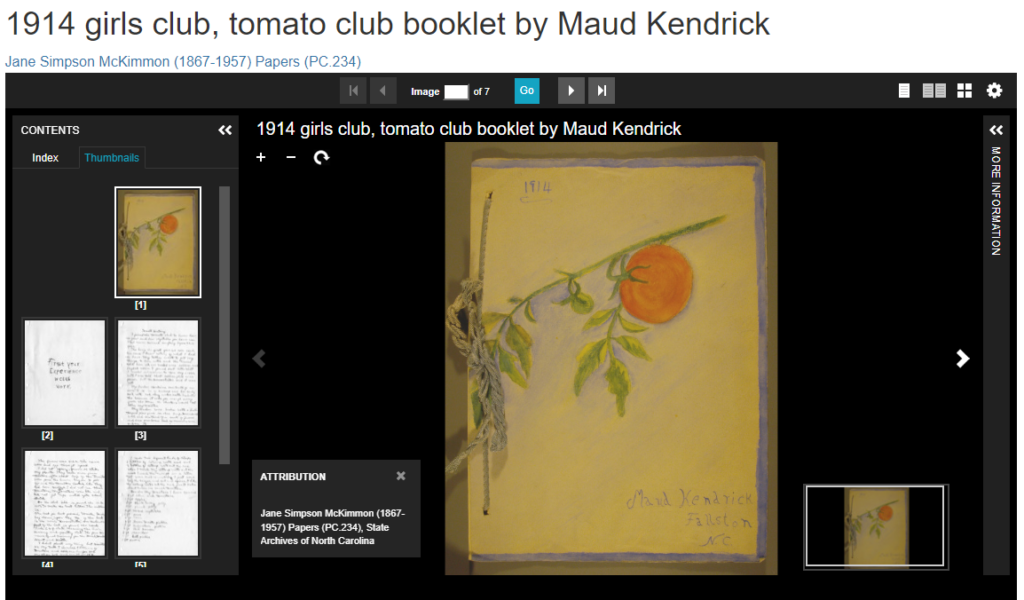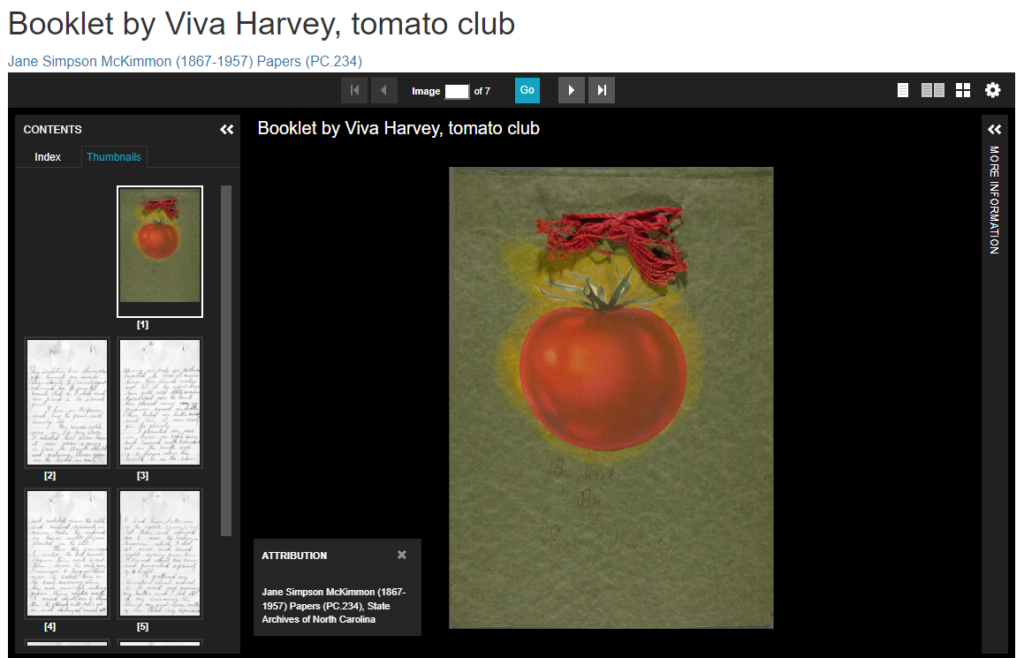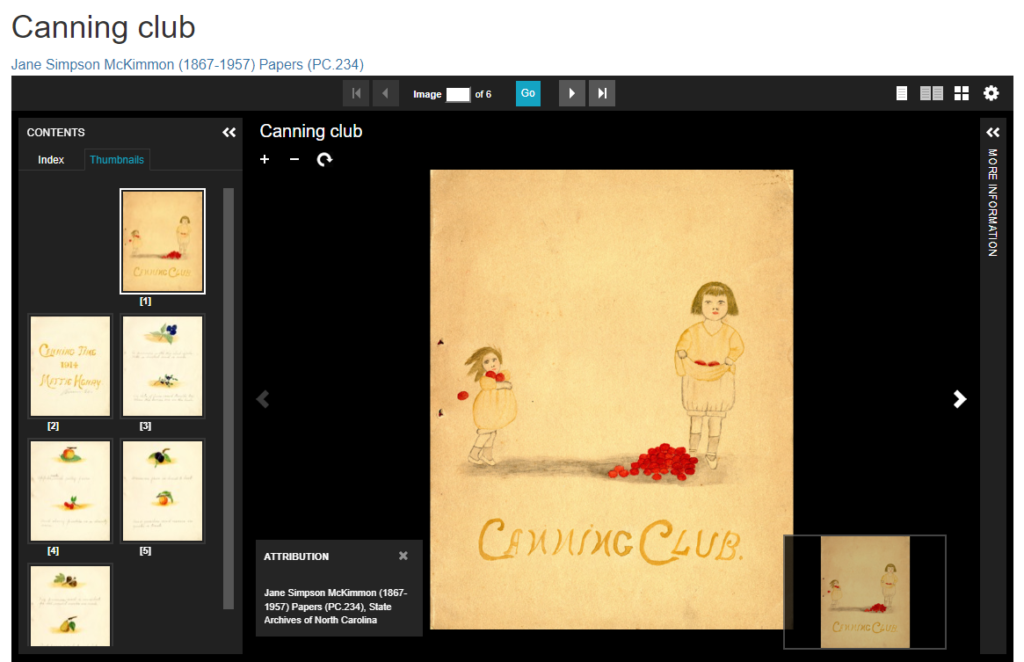
Brian Dietz, Virginia Ferris, and Laura Abraham of NC State University Libraries kindly took the time to answer questions from Sara Brumfield of FromThePage, and discussed their project and experience using the platform.
Brian Dietz is the Digital Program Librarian for Special Collections at the NC State University Libraries. Virginia Ferris is the Lead Librarian for Outreach and Engagement at the NC State University Libraries. Laura Abraham is the University Library Technician at the NC State University Libraries.
First, tell us about your documents.
We have a couple of different sets of materials in our FromThePage collection. One set includes handmade tomato club booklets created by young girls in rural North Carolina around 1912-1915 who were part of clubs where they learned how to grow, can, and sell their own tomatoes through North Carolina’s early Home Demonstration Service founded by Jane McKimmon. These documents are part of the Jane S. McKimmon Papers, held by the State Archives of North Carolina. While the booklets are not held in our collections at NC State, we digitized them as part of an LSTA-funded grant partnership with the State Archives called “Green ‘n’ Growing” that was carried out over 15 years ago. (The project manager position was Brian’s first job at NC State.) We host the digitized tomato club booklets along with the other materials scanned as part of the project in our Rare and Unique Digital Collections site. There are 254 booklets, with 1,627 pages. They are almost exclusively handwritten, and many have illustrations or are bound with ribbons.
In spring 2021, we worked with Maggie Simon, Associate Professor of English at NC State University, to organize an transcribathon where community members contributed to making the materials more discoverable through transcription.
What are your goals for the project?
With the transcribathon, we had three big goals. The first was around collaborating with a faculty member. After several years of teaching collaborations with Maggie Simon, we had discussed the idea of a transcribathon and considered materials in our collections that would lend themselves to this type of event. When we came upon the tomato club booklets as a possibility, we all agreed that this would be an excellent set of materials to feature for transcription and community outreach. Dr. Simon had previous experience as part of transcribathons with the Early Modern Recipes Online Collective, and was a knowledgeable and enthusiastic partner in the planning process and in engaging volunteers during our live event.
Second, it was an opportunity to engage further with the university’s cooperative extension work. As already mentioned, these booklets were created as part of the Home Demonstration service, which in the 1960s became known as Home Economics, and is now the Family and Consumer Sciences department in the university's College of Agriculture and Life Sciences. We’ve done a number of extension-related digitization projects since “Green ‘n’ Growing”; that project was sort of the one that kicked it all off. We now have over 42,000 resources topically related to “community and extension”. We had several extension folks participate in the transcribathon, which was really gratifying.
Third, transcribing these unique booklets enhances their discoverability. Many of them are handwritten by very young girls, so extra attention and analysis was needed to decipher them. The booklets are fascinating and lend themselves well to a close reading through the process of transcription. Many volunteers shared that their relatives had belonged to tomato clubs, or that they themselves as children were members of 4-H programs that evolved later, and felt a connection to the authors through the experience. Having the booklets transcribed now will help future researchers discover and engage with these materials in new ways.
How are you recruiting or finding volunteers/collaborators?
We recruited volunteers through promotion of the transcribathon event through our departmental blog and social media posts, as well as through the Libraries’ External Relations channels and social media platforms. We reached out to partners and contacts in the College of Agriculture and Life Science, Cooperative Extension, and the College of Humanities and Social Sciences, with faculty partners in the departments of English, History, and Public History. We also planned a panel discussion featuring scholars from NC State, UNC Chapel Hill, North Carolina A&T State University, and the North Carolina 4-H Program to discuss the history and context of the tomato clubs (recording available online), and the panelists shared the event and transcription project information within their professional networks more broadly. The volunteers who joined the project came from diverse backgrounds, ranging from undergraduate students at NC State to former 4-H members and extension agents across North Carolina.
Can you share your experience using FromThePage?
The Special Collections Research Center was already familiar with FromThePage, our staff having used it for other transcription projects.
One of the things we like the most about FromThePage is the IIIF integrations. Our digital collections site utilizes International Image Interoperability Framework APIs, as does FromThePage. This makes getting images and basic metadata into the platform extremely easy. It’s just a matter of submitting the URL of the resource’s manifest. In fact, for the transcribathon, we used the feature that allowed us to submit batches of IIIF manifests. We think we got 240-plus booklets loaded into FromThePage in five batches of 50. It was so easy. We’ve also begun the discussion of how to retrieve transcribed text from FromThePage and incorporate the text into our digitized collections platform.
We have a fair amount of our own documentation related to transcribing and using FromThePage. Of course, we needed to extend this for a non-staff audience, and also create guidelines specific to the transcribathon event. Working with Sara in the lead up to it resulted in improvements in what we had created for staff and volunteer use, as well as what we made available in our FTP collection.
As for using FromThePage during the transcribathon, on the day of the event, we introduced our participants to FromThePage using live instructions and demonstrations over Zoom. We also shared a Google spreadsheet with the booklets' individual links, and volunteers could assign themselves one and mark it as in progress or ready for review. We used break out rooms in Zoom for further instruction, which gave assistance to some participants without occupying the time of the entire group.
How does FromThePage & crowdsourcing fit within a university library/special collections?
The transcribathon event, and transcription more generally, touches a lot of areas we value, including accessibility, discoverability, featuring unheard voices, connecting communities, student success, and technical infrastructure.
Through digitization, FromThePage, and our event, we’ve been able to shine a light on the unheard voices of young girls (many from rural areas in North Carolina) and their activities. While the focus of the booklets was on their club work, we also got a window into their lives, opinions, capabilities, and creativity.
The event also connected communities, because as we were highlighting our extension-related resources, some participants shared their own experiences with extension club work.
What would you tell folks considering a similar project?
From the perspective of outreach and engagement, think creatively about what materials you can use and how you can promote them to different audiences. One set of materials can hold many different points of interest, be it personal, academic, or professional, to many different communities. It was gratifying to see volunteers from such different backgrounds coming together to work with the tomato booklets and interact with one another during our live Zoom support session. Many shared that they found the experience to be informative, fun, and meaningful.
Anything else you'd like to tell us?
Like a lot of institutions, we turned to transcription and FromThePage fairly early in the pandemic. Honestly, we were looking for projects that our student employees could work on while not physically on campus. It was a plus that they could continue doing collections-related projects that would result in making materials more widely available. We assume this is generalizable, but we kept people employed, doing engaging and meaningful work, during a really tough time. We found that our student staff really enjoy this work, too. It’s a change of pace from many of their usual responsibilities, it allows them to engage with collection materials in a different way, and I think they enjoy deciphering handwriting!
Do you have any cool materials featuring local history you'd like transcribed? Schedule a call with Ben and Sara to find out how FromThePage can help you.








